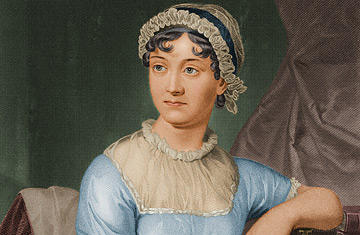
Jane Austen circa 1790
Much of the present enthusiasm for Jane Austen can be credited to a 70-year-old screenwriter named Andrew Davies. In 1995 Davies adapted Pride and Prejudice for the BBC. Presumably after sacrificing a pudding to the ghost of the departed Austen, he added a scene in which Colin Firth, as Mr. Darcy, takes a swim in a pond and emerges with his Regency-era nipples visible through his wet shirt. It's an iconic moment precisely for what it doesn't show: no skin is revealed, nobody touches anybody, but there's more sex in the air, in invisible, intangible form, in those 2 minutes than in 100 hours of softcore Cinemax writhings.
Davies has now adapted four of Austen's six finished novels: he wrote the 1996 TV production of Austen's Emma, and he has Northanger Abbey and Sense & Sensibility in the pipeline for Masterpiece Theater next year. (He also adapted both of the Austenesque Bridget Jones novels.) "I've been a bit shameless about butching them up a bit," he says merrily. "I wrote a wood chopping scene for [Sense & Sensibility's] Edward, who's the rather shy, bashful one. I thought he ought to do something a bit active. It happened to be pouring down with rain at the time, so I think I might have written another wet shirt scene."
That he might. It was a cliché 10 years ago to say that the Austen phenomenon was big. It has now burst completely out of its bodice. Jane Austen, who recorded the last gorgeous gasp of pre-industrial England, has herself become a thriving, throbbing industry. Pride & Prejudice alone sold 318,000 copies last year, according to Nielsen BookScan, and this is to say nothing of the numerous spinoffs by other, lesser hands that imagine the later life of Elizabeth Darcy, or her sex life, or recast her and her husband (or Austen herself) as detectives (the winning title in this category has to be Suspense & Sensibility).
And books are the least of it. Becoming Jane, an Austen biopic starring Anne Hathaway, opens this week. September will bring the movie of The Jane Austen Book Club. Masterpiece Theater is currently re-filming four of the novels—Mansfield Park, Northanger Abbey, Persuasion, and Sense & Sensibility—in preparation for a marathon broadcast of The Complete Jane Austen next year. We can't seem to put down Austen, or leave her alone, or get to the end of her. She has become a commodity for which there is an infinite demand.
On the face of it Austen is an unlikely object for cult worship. She was born in 1775 in Hampshire, England, the seventh of a country clergyman's eight children. She received a smattering of education. She later moved to the city of Bath, which she didn't much care for. She is known to have received one marriage proposal, from a younger man with the odd name of Harris Bigg-Wither, which she at first accepted and then, a day later, declined. Although she started writing fiction in 1789, Austen didn't publish a novel until 1811; all of her six novels would appear anonymously. Six years later she was dead of an unspecified illness. By our standards she barely seems to have lived at all.
But there she is onscreen in Becoming Jane, vital and vivacious, although Anne Hathaway, with her broad mouth and her un-pin-uppably wavy hair, doesn't much resemble the one authenticated image we have of Austen, a sketchy portrait by her sister Cassandra that now hangs in the U.K.'s National Portrait Gallery. (Olivia Williams, who starts in the upcoming tele-bio-pic Miss Austen Regrets, can claim the better likeness.) Irrepressible and unconventional, Jane plays cricket and the piano, scribbles in her bedroom, and flirts with a witty but financially precarious young lawyer named Tom Lefroy, played by James McAvoy (you may recognize him as the faun from the Narnia movie, though here he's more of a satyr). Lefroy is not only rudely handsome, he's at least partly historically factual—there was a real Lefroy, with whom Austen really flirted. "He has but one fault, which time will, I trust, entirely remove," Austen wrote in a letter to Cassandra. "It is that his morning coat is a great deal too light."
